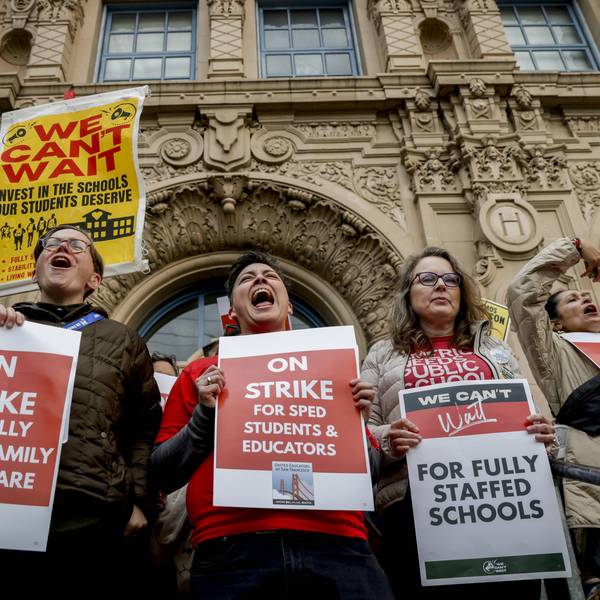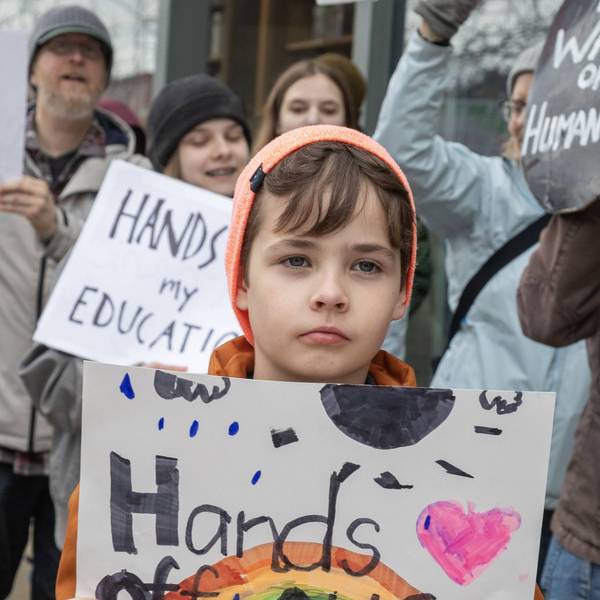Detroit Teachers Hold Sickout to Protest Broken Funding Promises
'By refusing to guarantee that we will be paid for our work, [Detroit Public Schools] is effectively locking our members out of the classrooms'
Nearly every public school in Detroit was shut down on Monday as teachers city-wide held a "sickout" over news that the embattled district would be unable to pay them past June 30.
The protest kept 94 out of 97 schools closed after the Detroit Federation of Teachers (DFT) announced the action on Sunday. Detroit Public Schools (DPS) emergency manager Judge Steven Rhodes told the union over the weekend that the district would not have enough money to pay its 2,600 teachers' already-earned salaries without additional funding from the legislature.
Summer school and additional services would also be canceled, he said.
"There's a basic agreement in America: When you put in a day's work, you'll receive a day's pay. DPS is breaking that deal," said DFT interim president Ivy Bailey. "Teachers want to be in the classroom, giving children a chance to learn and reach their potential. Unfortunately, by refusing to guarantee that we will be paid for our work, DPS is effectively locking our members out of the classrooms."
The school system's total debt is more than $3 billion. Rhodes warned state lawmakers in early March that the district was rapidly running out of money and would be broke on April 8. In response, the state Senate approved $715 million in funding, which the House is currently debating.
"Teachers in Detroit have sacrificed greatly to ensure our schools stay open and our kids have the opportunity to learn," Bailey said. "But working without pay is the straw that breaks the camel's back. Teachers have mortgage payments, utility bills, and grocery bills. Being paid for their work isn't a luxury; it's a necessity."
Monday's sick-out--staged as such because it is illegal for teachers to strike under Michigan law--is the latest in a series of similar actions. Educators held a sickout in January to protest the district's decrepit infrastructure, which included crumbling school buildings, cockroach and rat infestations, and overwhelmingly large class sizes.
Earlier this year, the Detroit school board filed a federal lawsuit against the state, alleging that the Michigan emergency manager law is partially to blame for the financial troubles.
An Urgent Message From Our Co-Founder
Dear Common Dreams reader, The U.S. is on a fast track to authoritarianism like nothing I've ever seen. Meanwhile, corporate news outlets are utterly capitulating to Trump, twisting their coverage to avoid drawing his ire while lining up to stuff cash in his pockets. That's why I believe that Common Dreams is doing the best and most consequential reporting that we've ever done. Our small but mighty team is a progressive reporting powerhouse, covering the news every day that the corporate media never will. Our mission has always been simple: To inform. To inspire. And to ignite change for the common good. Now here's the key piece that I want all our readers to understand: None of this would be possible without your financial support. That's not just some fundraising cliche. It's the absolute and literal truth. We don't accept corporate advertising and never will. We don't have a paywall because we don't think people should be blocked from critical news based on their ability to pay. Everything we do is funded by the donations of readers like you. Will you donate now to help power the nonprofit, independent reporting of Common Dreams? Thank you for being a vital member of our community. Together, we can keep independent journalism alive when it’s needed most. - Craig Brown, Co-founder |
Nearly every public school in Detroit was shut down on Monday as teachers city-wide held a "sickout" over news that the embattled district would be unable to pay them past June 30.
The protest kept 94 out of 97 schools closed after the Detroit Federation of Teachers (DFT) announced the action on Sunday. Detroit Public Schools (DPS) emergency manager Judge Steven Rhodes told the union over the weekend that the district would not have enough money to pay its 2,600 teachers' already-earned salaries without additional funding from the legislature.
Summer school and additional services would also be canceled, he said.
"There's a basic agreement in America: When you put in a day's work, you'll receive a day's pay. DPS is breaking that deal," said DFT interim president Ivy Bailey. "Teachers want to be in the classroom, giving children a chance to learn and reach their potential. Unfortunately, by refusing to guarantee that we will be paid for our work, DPS is effectively locking our members out of the classrooms."
The school system's total debt is more than $3 billion. Rhodes warned state lawmakers in early March that the district was rapidly running out of money and would be broke on April 8. In response, the state Senate approved $715 million in funding, which the House is currently debating.
"Teachers in Detroit have sacrificed greatly to ensure our schools stay open and our kids have the opportunity to learn," Bailey said. "But working without pay is the straw that breaks the camel's back. Teachers have mortgage payments, utility bills, and grocery bills. Being paid for their work isn't a luxury; it's a necessity."
Monday's sick-out--staged as such because it is illegal for teachers to strike under Michigan law--is the latest in a series of similar actions. Educators held a sickout in January to protest the district's decrepit infrastructure, which included crumbling school buildings, cockroach and rat infestations, and overwhelmingly large class sizes.
Earlier this year, the Detroit school board filed a federal lawsuit against the state, alleging that the Michigan emergency manager law is partially to blame for the financial troubles.
Nearly every public school in Detroit was shut down on Monday as teachers city-wide held a "sickout" over news that the embattled district would be unable to pay them past June 30.
The protest kept 94 out of 97 schools closed after the Detroit Federation of Teachers (DFT) announced the action on Sunday. Detroit Public Schools (DPS) emergency manager Judge Steven Rhodes told the union over the weekend that the district would not have enough money to pay its 2,600 teachers' already-earned salaries without additional funding from the legislature.
Summer school and additional services would also be canceled, he said.
"There's a basic agreement in America: When you put in a day's work, you'll receive a day's pay. DPS is breaking that deal," said DFT interim president Ivy Bailey. "Teachers want to be in the classroom, giving children a chance to learn and reach their potential. Unfortunately, by refusing to guarantee that we will be paid for our work, DPS is effectively locking our members out of the classrooms."
The school system's total debt is more than $3 billion. Rhodes warned state lawmakers in early March that the district was rapidly running out of money and would be broke on April 8. In response, the state Senate approved $715 million in funding, which the House is currently debating.
"Teachers in Detroit have sacrificed greatly to ensure our schools stay open and our kids have the opportunity to learn," Bailey said. "But working without pay is the straw that breaks the camel's back. Teachers have mortgage payments, utility bills, and grocery bills. Being paid for their work isn't a luxury; it's a necessity."
Monday's sick-out--staged as such because it is illegal for teachers to strike under Michigan law--is the latest in a series of similar actions. Educators held a sickout in January to protest the district's decrepit infrastructure, which included crumbling school buildings, cockroach and rat infestations, and overwhelmingly large class sizes.
Earlier this year, the Detroit school board filed a federal lawsuit against the state, alleging that the Michigan emergency manager law is partially to blame for the financial troubles.

